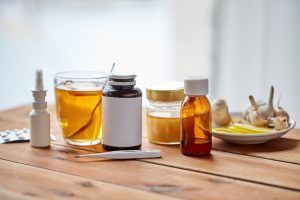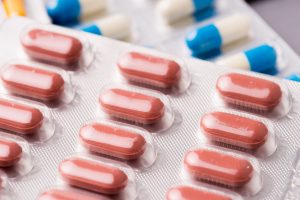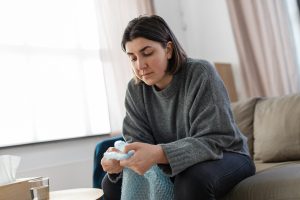Vaginal yeast infections are much more common than you think. If you believe that you are going through an episode that is decreasing the quality of your overall well-being, know that it is a highly treatable condition you will most likely go through at least once more in your life.
However, this doesn’t change the fact that nobody would prefer leaving vaginitis untreated and discourage you from finding the right solution or treatment for what you are going through.
If you think that you have a yeast infection and are asking yourself, “how long does a yeast infection last?” in this article, we will inform you in-depth. So get ready to learn about the recovery duration and ways to treat your yeast infection through the information we share here.
How Long Does a Yeast Infection Last?
If it’s mild, an infection lasts around three days and becomes cleared up. But if you are experiencing severe yeast infection symptoms, the infection treatment can most likely be prolonged and may last up to two weeks.
What determines how long your treatment is going to last is the severity of your case. Otc treatment, treatments, and home remedies can help with mild infections, but the most effective treatment is possible with prescription options.

Can a Yeast Infection Go Away on Its Own?
Sometimes, treatment isn’t even needed for yeast infections to go away. Your treatment depends on the seriousness of what you are going through. Mild infections don’t need any treatment.
If you take care of yourself and refrain from habits and lifestyle choices that will cause an imbalance in your yeast levels, you won’t need any professional or medicinal help, and your infection will go away. Of course, this can’t be guaranteed, but there is a chance that it can happen.
How to Get Rid of a Yeast Infection
There are various ways to get rid of a yeast infection. If you see a doctor when you’re going through a mild episode, your doctor might recommend one of the following:
Single-Dose Oral Medication
If you see a doctor treat your yeast infection, you might get prescribed fluconazole (Diflucan). This oral medication will effectively treat your condition with a single dose. Fluconazole isn’t recommended to those who are pregnant. If your symptoms fall into the more severe range, Your doctor will probably advise you to take two single doses within three days.
Short-Course Vaginal Therapy
Antifungal medications can help clear your yeast infection, and you will only need three to seven days to stick to it. They can come in various forms like ointments, creams, suppositories, tablets, terconazole, and miconazole. These medications can either be purchased as over-the-counter medications or only by prescription.
If neither of these treatments works for you, or if your infection turns back within two months, healthcare providers might put you through treatment plans created for those with severe symptoms. In this case, there will be three different paths your doctor will need to choose from:
Azole Resistant Therapy
Azole-resistant therapy is a type of treatment that includes a capsule insertion into the vagina. The capsule contains boric acid, a known cure for particular vaginitis. However, you can not take the medication orally as it can be fatal and is only used for treating candida fungus, which you can not cure with other antifungal agents.
Long-Course Vaginal Therapy
Long-course vaginal therapy refers to being prescribed an antifungal medication to be taken daily, stretching up to two weeks in the beginning. After that, medication treatment will be followed for six months, with once-a-week use.
Multi-Dose Oral Medication
Multi-dose oral medication is prescribed two or three doses of antifungal medicine to be taken orally. Unfortunately, this treatment isn’t found suitable for those in pregnancy.
How Yeast Infections Are Treated At Home
There are some at-home DIY options to treat yeast infections, but the most commonly preferred way of treating vaginal candidiasis is by taking antifungal medicine. They can be found in drug stores, or pharmacies can help you with them.
If you want to avoid chemicals and go as natural as possible, here is a list of remedies you can use to treat your vaginal yeast infection:
- Garlic
- Apple cider vinegar
- Coconut oil
- Tea tree oil
- Essential oil of oregano
- Greek yogurt
- Probiotic supplements and suppositories
Most of these can be taken orally or diluted and used in your bath water. They are usually preferred as solutions to mild yeast infections rather than those requiring more rigid treatment types.
How Do You Know When a Yeast Infection Is Gone?
Some things can be viewed as signs that a yeast infection is healing. For example, indicating that your condition is subsiding, you might go through these stages that show you that your candidiasis episode is coming to an end:
Your vaginal discharge is going back to normal with its consistency and odor,
The itchiness around the vaginal area is going away, and the physical sensations related to candidiasis are disappearing,
Rash, swelling, or redness subsided, leaving the genitals appearing and feeling healthy again.
For other forms of yeast infections, recovery may take longer than it takes for vaginal candidiasis. Commonly seen among those who breastfeed, candidiasis of the breast can be an example of an infection type that needs a longer time for recovery.
To ensure that you are treating candidiasis most effectively, get help from a medical professional. This way, your recovery shouldn’t take longer than what’s expected.
When to See a Doctor
If you have tried at-home remedies and been taking commonly used drugs to treat candidiasis and have seen no improvement in your condition, it might be time you visit a doctor to take further action.
If you haven’t taken any active steps toward recovery, make sure you see a doctor promptly. When you leave your candidiasis untreated or use ineffective methods to cure it, you can prolong the treatment period, increasing expenses and mental disturbance caused by inadequate treatment attempts.
Frequently Asked Questions
With candidiasis, it would be ideal if you avoided many activities. So here are some things to avoid, to name a few: Don’t go overboard with foods that increase your body’s level of already imbalanced yeast.
Your condition came from the already existing yeast in your body becoming overgrown. So please do not add to it. Do not wear underwear and clothes that won’t leave room for your affected area not to breathe.
Also, stay away from nylon and all other types of fabric that will hold body heat and moisture, feeding the condition that prevents recovery. Do not douche. Douching messes up vaginal pH levels and is usually regarded as one of the reasons you have candidiasis in the first place.
Don’t aggravate the existing condition; add fuel to the fire by touching your vagina again. Don’t take too many antibiotics. Antibiotics are one of the reasons you might have recurrent episodes of candidiasis. If you don’t have to, take a break from your antibiotic use and leave room for the infection to go away.
Mild vaginitis can go away by itself. However, when discussing the connection between periods and yeast infections, it is usually seen that the yeast infection clears up as menstrual blood raises the vaginal pH levels, destroying the environment that fosters the growth of candida.
Based on this information, you can expect that your infection clears when you have your period.
If the infection responds well to antifungal medication, penile yeast infections can go away within one week or two. Relief is also possible if the condition is treated early.
Sexually active men are advised to inform their partners about their infection to prevent it from spreading to their partners. Yeast infections have the potential to be passed between sexual partners, so it is also beneficial for you to know if your partner is treated for candidiasis. This way, you can avoid passing the disease between each other.
If your symptoms are mild, you might recover from a one-off, single dose of fluconazole. However, if the severity is a bit higher, doctors recommend you to use two doses and put three days between each time you take the medication.
Candidiasis treatment doesn’t take too much time, but giving you false hope that you can cure it within 24 hours would be too much. Some medications can be effective within 72 hours, but not 24.
If you seek an urgent solution to your infection, we highly recommend contacting our team to get professional info on how to move forward and what is the proper treatment for you. As Doctoralexa, we are here to help.
Oral thrush is candidiasis, but not the particular one we discussed in this article. While one occurs in the mouth, the other is a type of vaginitis seen around the vaginal area.
We don’t know, how did you? Any chance you might have used the tips we shared above? We’d love to know.
Yeast infections aren’t deadly, and they are highly treatable. So, in this case, we can’t say that they will be the end of you. Just find the proper treatment that suits you and your lifestyle, and in (hopefully) no time, you will be good to go.
Get Professional Help With Doctor Alexa
If you can’t get rid of candidiasis without asking for the opinion of a medical health professional, or if you see that your condition requires alternative treatment and care from a doctor, getting the proper help can be life-changing.
As Doctor Alexa, we give you complete control of your health and provide effortless ways to access healthcare services from the comfort of your home. Our compassionate healthcare provider team is here for you to get the quality health treatment that you never thought was possible.
Our goal is to provide affordable, world-class healthcare services and a patient experience that showcases excellence. You deserve nothing less.
To learn more about everything we offer that will help you treat the conditions you are struggling with at an affordable cost and from the comfort of your own home, reach out to Doctoralexa today.





